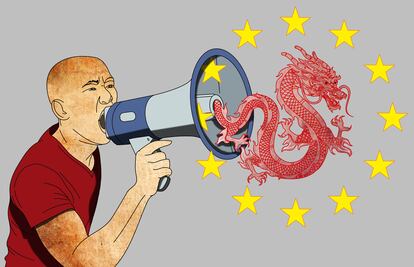European public goods and fiscal rules for the new economic policy
The EU will not achieve its goals for strategic autonomy and decarbonization, without a budget to support them

U.S. National Security Adviser Jake Sullivan recently delivered a speech outlining the U.S. international economic policy strategy. As communication professionals know well, the medium is fundamental to the message. As was seen in this case: it was the national security adviser explaining the international economic policy strategy. That’s the message: national security dictates the economic strategy.
The medium is the message, and repetition amplifies the impact of the message. Applying a word cloud analysis, the most repeated words in the speech were: industrial, infrastructure, investment, technology, American workers and supply chains. And which words were absent in the speech? Public debt and fiscal deficit.
It is the “New Economic Policy” that we have outlined in these pages, focused on national security, resilience and inequality, with the active use of tariffs, subsidies and sanctions, and an emphasis on investment, rather than saving. It is the so-called “foreign policy for the middle class,” focused on investing in the American economy and its workers with an aggressive industrial policy that puts the U.S. first, and everything else, including its allies, second. It is what Jake Sullivan suggested becomes a new “Washington Consensus” — which is ironic, as this new strategy increasingly resembles the economic policy China has been pursuing for decades.
The speech develops the new American national security doctrine, which for the first time explicitly intends to delay Chinese technological progress in the field of advanced semiconductors. It also exposes the American government’s conviction that the economic strategy of the last decades, with trade liberalization and deregulation as articulating principles, harmed workers and opened the way for populist movements which endangered democratic stability, due to the persistent deterioration of the economic expectations of the working middle class and of the depopulated and deindustrialized regions.
It is an interventionist policy, where the objectives of national security and climate change, rather than growth or fiscal stability, determine economic policy — as shown by the huge program of subsidies to combat climate change, which, being unlimited, may reach a trillion dollars. Where the concept of public good expands widely: including, for example, the value chains of strategic materials — such as the so-called “rare earths” necessary to manufacture batteries — which, according to this new doctrine, cannot be trusted to the private sector. Where the use of trade sanctions and restrictions is pervasive: for example, the concept of “small yards with high fences,” which describes the strategy of severe trade restrictions with China in the semiconductor industry. A strategy that risked going too far with the concept of “decoupling” (implying a total disconnection from the Chinese economy) and that Jake Sullivan tried to bring closer to the European concept of “derisking” (risk reduction in ongoing economic relations with China).
Why this long introduction to the subject of this article, the pending reform of European fiscal rules? Because to be competitive in this new geostrategic context, Europe needs a fiscal framework whose objective is to maximize support for the new economic policy, not fiscal rules whose objective is to reduce debt no matter what. Because Europe will not be able to achieve its objectives of strategic autonomy — which includes national security and defense, technological development, and energy autonomy — and decarbonization without a budget that supports it.
Strategic autonomy and decarbonisation are common European objectives and, as such, their implementation must be articulated in part through European public goods that can reach the necessary scale and avoid increasing economic divergences between countries. Let’s be clear: the insistence of some countries on minimizing European public goods and returning to automatic debt reduction rules is their way of preserving, behind the veil of fiscal discipline, their competitive advantage, since they believe they have the fiscal space that its European competitors lack to domestically finance this new economic policy. See, for example, the recent German proposal of energy subsidies for its industry.
Let’s also be clear: the articulation through European public goods does not imply transfers among countries. But it does imply in many cases common financing which, as seen with the NGEU programme, increases economic resilience, generates positive conditionality for structural reforms, and contributes to the creation of a European risk-free asset, a key piece of strategic autonomy — the U.S. would not have its geostrategic power without the dollar and treasury bonds, nor would China have its geostrategic clout without its huge foreign currency reserves. In addition, expanding the issuance of European bonds and consolidating them into a single and predictable product would eliminate their exotic nature and reduce their cost of financing. And yes, this would require deploying new European revenues for the service of this debt, which may include the transfer of a share of national VAT revenues. Politically difficult, but unavoidable.
Agreeing on a program of European public goods that gives continuity to the NGEU — and, along the way, resolves the uncertainty about the rollover of the bonds that finance it — is a fundamental prerequisite for addressing the debate on fiscal rules. The broader the spectrum of European public goods, the more national fiscal rules can focus on the sustainability (not the automatic reduction, two very different concepts) of the debt, and vice versa. Without European public goods, fiscal rules must include exceptions for a large national investment budget, a suboptimal solution that will reduce European oversight, increase the likelihood of inefficient spending, and widen economic divergences between countries.
A greater spectrum of European public goods that cover a significant part of the investment budget will allow the design of fiscal rules that, individually for each country, combine the management of the economic cycle with the improvement of debt sustainability. This requires a countercyclical fiscal policy that takes advantage of expansionary periods to opportunistically reduce debt ratios, without automatisms and preserving social investment. In fact, this is what has happened in 2022-23: smart fiscal policy that has helped reduce inflation and has reduced debt and deficits while preserving investment thanks to the NGEU. The new fiscal framework should consolidate the experience of 2022-23, focusing on the quality of fiscal policy and the cyclical context, and not on arbitrary and inefficient quantitative criteria doomed not to be met.
The U.S. and China have decided to prioritize investment to be world leaders. China dominates the production of batteries and already exports more cars than Germany. Europe must decide if it wants to be a leading actor or a supporting character in this new geostrategic contest. The European fiscal framework will have the answer.
Tu suscripción se está usando en otro dispositivo
¿Quieres añadir otro usuario a tu suscripción?
Si continúas leyendo en este dispositivo, no se podrá leer en el otro.
FlechaTu suscripción se está usando en otro dispositivo y solo puedes acceder a EL PAÍS desde un dispositivo a la vez.
Si quieres compartir tu cuenta, cambia tu suscripción a la modalidad Premium, así podrás añadir otro usuario. Cada uno accederá con su propia cuenta de email, lo que os permitirá personalizar vuestra experiencia en EL PAÍS.
¿Tienes una suscripción de empresa? Accede aquí para contratar más cuentas.
En el caso de no saber quién está usando tu cuenta, te recomendamos cambiar tu contraseña aquí.
Si decides continuar compartiendo tu cuenta, este mensaje se mostrará en tu dispositivo y en el de la otra persona que está usando tu cuenta de forma indefinida, afectando a tu experiencia de lectura. Puedes consultar aquí los términos y condiciones de la suscripción digital.









































